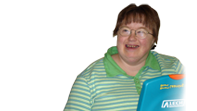CDHD Core UCEDD
| ID-Center on Disabilities and Human Development, UCEDD | |||
| Program Type | UCEDD | Fiscal Year | 2020 |
| Contact | Julie Fodor, PhD | ||
| [email protected] | |||
| Phone | 208-885-6128 | ||
| Project Description | |||
|
The University of Idaho Center on Disabilities and Human Development (CDHD) is improving lives for people with disabilities and their families through exemplary and innovative education, outreach, research, and service. We believe that these individuals and their families have the right to live, learn, work, and play in their own communities; access services that are centered on their strengths and abilities; make decisions, take risks, define the quality of life they choose; and make a contribution to society. The CDHD has worked with our Community Advisory Committee, the Idaho Council on Developmental Disabilities, Idaho's Protection and Advocacy entity, and other partners to identify the most important and immediate needs facing Idahoans with disabilities and their families. The result is a comprehensive five-year plan designed specifically to meet 11 identified ongoing, emerging, and unmet needs in the state of Idaho: abuse and neglect; specialized community supports; integrated employment and training; self-determination and self-advocacy; educational outcomes; improved interventions for youth in juvenile justice system; transportation; assistive technology; early identification/intervention; parent support; and inclusive child care. There are several significant obstacles to delivering services to people with disabilities in Idaho, such as: * Idaho has one of the highest poverty rates in the nation and one of the poorest health care systems * 1 in 6 children in Idaho live in poverty * Idaho currently ranks 50th in the nation in terms of primary care providers * Approximately 15.6% of the total population in Idaho, between the ages of 5-65, experience a disability * Approximately 59,705 or 42.5% of people over the age of 65 in Idaho have a disability * Idaho's special education system serves over 30,000 students between the ages of 3-21; very few students with severe cognitive disabilities are served in settings with their typically developing peers The CDHD and its partners has created an atmosphere of collaboration based upon the principles of equality, respect, and interdependence that has greatly improved the quality of life for people with disabilities, those at risk, and their families in the state of Idaho. Based on the 11 areas of need identified in our strategic planning process, the CDHD's five-year plan (2007-2012) was developed across four core function areas: (1) interdisciplinary pre-service and continuing education, (2) community service including training, technical assistance, and direct services, (3) research, and (4) information dissemination. Each goal and corresponding objective is aligned with one or more areas of emphasis as identified in the DD Act of 2000. In total, seven areas of emphasis are represented in our goals: quality assurance, education and early intervention; child care, health, employment, transportation, and other-assistive technology. The goals, objectives, and activities outlined in our five-year plan are designed to build Idaho?s capacity to serve, produce systemic change, and advocate for persons with disabilities and their families. We maintain and expect to increase an active presence in all parts of a state that is large, rural, and poor. We are committed to improving services to the un-served and under-served and to conducting our activities across diverse communities in a culturally competent manner. Through our role as a member of the AUCD's University Centers for Excellence on Developmental Disabilities (UCEDD), our desire is to train and educate the next generation of leaders in disability-related issues, create meaningful change that advances policy and practices, and disseminate best-practices and new information that will benefit us all. |
|||







